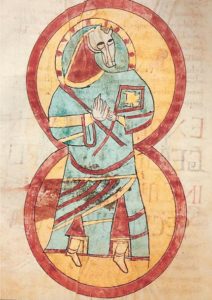Evènements ~ Events
24–25 April 2008. \ »Care and Conservation of Manuscripts,\ » the eleventh seminar, organised by the Arnamagnæan Institute, the Arnamagnæan Commission and the Royal Library of Denmark, will be held at the University of Copenhagen, Faculty of Humanities [Link]
Programme [Link]
Contact: ami[at]hum.ku.dk
Peter Springborg and Gillian Fellows-Jensen are the editors of the proceedings of the 10th seminar. All manuscripts for this should now have been sent to Peter at petersp[at]hum.ku.dk or Gillian at gfj[at]get2net.dk
21–25 July 2008. The Institute of Byzantine Studies within the School of History and Anthropology of Queen’s University Belfast is pleased to announce the Fifth International Conference on the Medieval Chronicle, at Queen’s University Belfast, Northern Ireland.
Themes of the conference are:
1. Chronicle: history or literature?
The chronicle as a historiographical and/or literary genre; genre identification; genre confusion and genre influence; typologies of chronicle; classification; conventions (historiographical, literary or otherwise) and topoi.
2. The function of the chronicle
The function of chronicles in society; contexts historical, literary and social; patronage; reception of the text(s); literacy; orality; performance
3. The form of the chronicle
The language(s) of the chronicle; inter-relationships of chronicles in multiple languages; prose and/or verse chronicles; manuscript traditions and dissemination; the arrangement of the text
4. The chronicle and the ‘reality’ of the past
How chronicles record the past; the relationship with ‘time’; how the reality of the past is encapsulated in the literary form of the chronicle; how chronicles explain the past; motivations given to historical actors; the role of the Divine
5. Art and Text in the chronicle
How art functions in manuscripts of chronicles; do manuscript illuminations illustrate the texts or do they provide a different discourse that amplifies, re-enforces or contradicts the verbal text; origin and production of illuminations; relationships between author(s), scribe(s) and illuminator(s)
Call for papers: papers in English, French, or German are invited on any aspect of Medieval Chronicle [If you would like to give a paper but feel unable to present a paper in any of the three main conference languages, please contact the conference organiser.] The organisers particularly invite papers which address the relationships between chronicles in the western (Latin) and eastern (Byzantine Greek) traditions; papers which address the link between art and text; and papers which deal with the Polish chronicle traditions. Papers will be allocated to sections to give coherence and contrast; authors should identify the main theme to which their paper relates. Papers read at the conference will be strictly limited to twenty (20) minutes in length. The deadline for abstracts is 1 February 2008 (maximum length one side A4 paper, including bibliography)
Contact: Dion C. Smythe, Institute of Byzantine Studies, Queen’s University, Belfast, Belfast, N. Ireland BT7 1NN, U.K. (dionsmythe[at]hotmail.com).
2–5 September 2008. \ »Teaching Writing, Learning to Write,\ » the XVIth Colloquium of the Comité International de Paléographie Latine (CIPL), will be held at Senate House, University of London. From the medieval viewpoint writing meant not only the skill of handwriting, but also the ability to write with \ »correct\ » understanding of grammar, punctuation, etc. The colloquium will address the psychology and sociology of the medieval scribe. How did scribes learn to write in the Middle Ages? What was the social and cultural significance of a script chosen for a particular function ? How was script influenced by features of fashion? What was the interface between scribe and reader and the graphic signs used to communicate a message? Such questions have an impact on the transmission of texts, the growth of literacy, and the history of reading. Contact: Pamela Robinson, Institute of English Studies, Univ. of London, Senate House, Malet St., London WC1E 7HU, U.K.
pamela.robinson[at]sas.ac.uk
[Link]
28-30 November 2008. Liber Conference Berlin. Manuscript librarians from across Europe will meet at the Staatsbibliothek Berlin to discuss matters of mutual professional interest. This Third International Conference of LIBER’s Manuscript Librarians Group follows meetings at the Kungliga Biblioteket, Stockholm, in 2000 and at the Koninklijke Bibliotheek, The Hague, in 2003.
The conference will focus on ways in which we communicate the manuscript holdings of our institutions to researchers, to scholars and to the public who visit exhibitions and use the internet. The meeting will work towards a greater mutual knowledge and an active exchange of information and experiences among European libraries, in keeping with the aims of the Group.
There will be a limit of 100 participants. As we anticipate a high demand, you are advised to book early
[Link]
The LIBER Manuscript Librarians Group recognises the unique significance of manuscript and archive collections, not only for the world of research and learning but also for the wider audience of those interested in history and cultural heritage. The primary aims of the Group are to act as a forum for curatorial concerns, and to enhance understanding and practical cooperation among curators across Europe, taking account of the differences in approach which have occurred historically.
Leave a comment
PAGES ANNEXES
Auteur du blog : Jean-Luc DEUFFIC




